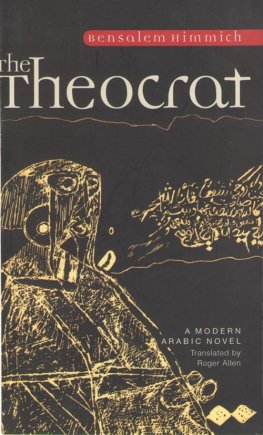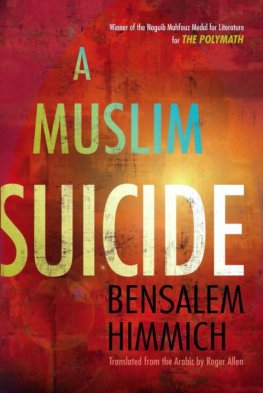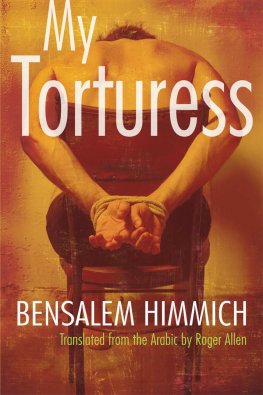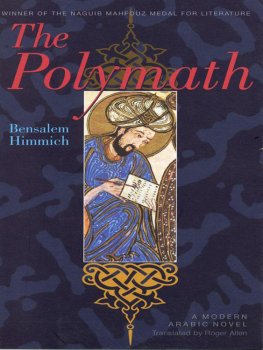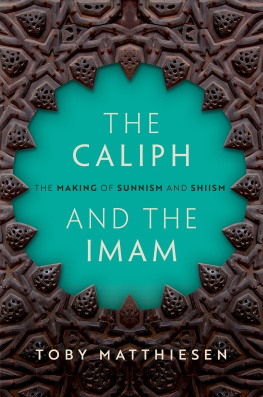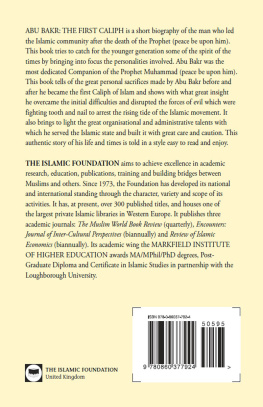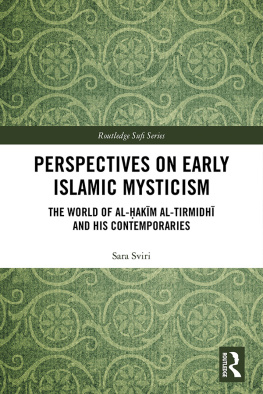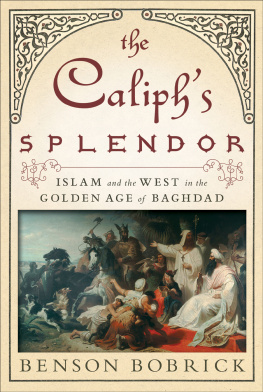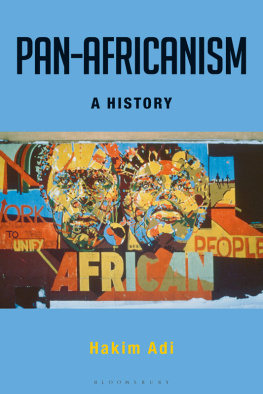Bensalem Himmich
The Theocrat
I begin this translators note to The Theocrat, the English translation of Bensalem Himmichs novel, Majnun al-hukm (1989), with what may be a somewhat unusual admission: my reasons for selecting this particular work for translation are, firstly, that my reading of the original Arabic text suggested to me almost immediately that it would pose unusually difficult challenges for the translator, and secondly (as a consequence of those challenges), that the resulting English version would almost certainly confront its readers with a narrative that illustrates some of the particularities of contemporary Arabic novel writing.
In the context of Western reactions to the award of the Nobel Prize for literature to the Egyptian novelist, Naguib Mahfouz in 1988 and to the published translations of Arabic novels that have followed that event, I have been concerned, in selecting novels for translation, to identify works that tend to distance themselves from the expectations (whether implicit or explicit) of Western readers regarding the nature, techniques, and purposes of fiction. In other words, I have hoped to find examples of Arabic novels that, through the process of transfer, of translation, across the cultural divide between Arabic-speaking and English-speaking countries, will manage to convey to readers of English aspects of the more intrinsically Arab and Arabic contributions to contemporary Arabic fiction rather than those which, in one way or another, can be seen as replications of the Western tradition of fiction, albeit transplanted to a different (and even, exotic) cultural environment. This perception does not, needless to say, reflect an either/nr situation After all, the novel has been and remains a world-wide phenomenon of breath-taking variety. However, as students who investigate the pleasing varieties of this maximally adaptive genre search for elements of innovation and change in other world cultural traditions as well as their own, it is to be hoped that the enormous variety of the contemporary Arabic novelistic tradition may also become a participant in and a focus of such investigations.
In making the above statement about confrontation, I am not merely alluding to the fact that The Theocrat is a translation in English of an Arabic novel written by a Moroccan. One of the more fortunate consequences of the Nobel award to Naguib Mahfouz has been an increase in the selection of Arabic novels that are available in English translation, although admittedly there are more from some countries (particularly Egypt) than others. Even so, Moroccan fiction is represented in current (2001) listings by works of Muhammad Shukri, Muhammad Barrada, and Leila Abouzeid. Nor am I referring to the fact that The Theocrat advertises itself as a novel of historical fiction. For, quite apart from the long-established European tradition of historical novels, for which a short list would include writers such as Walter Scott, Alexandre Dumas, Leo Tolstoy, and Umberto Eco, the modem tradition of the Arabic novel also provides some notable examples of this subgenre of novel-writing. Among those available in English translation are the Egyptian novelist, Gamal al-Ghitanis, Zayni Barakat and Abd al-Rahman Munifs Variations on Night and Day (that being the third volume of a quintet of novels, under the general title of Cities of Salt [Mudun al-milh]). In talking above about a text that confronts, what I do have in mind is that, with The Theocrat, Bensalem Himmich writes a novel that challenges its readers with not only the organizational logic of the narrative but also the sheer virtuosity of his varied application of language in order to revive and imitate samples from the great narrative traditions of the Arabic heritage. In the context of this English version, it probably does not need to be emphasized that, as part of the translation process, the very challenge that Himmichs novel presents to readers of the Arabic original is not merely transferred but amplified.
To begin with, the topic of Himmichs novel as the Arabic title, Majnun al-hukm (literally, he who is crazy in rule) makes clear is one of Arab and Islamic historys most perplexing figures, al-Hakim bi-Amr Illah (the one who rules by order of God), the Fatimid caliph and ruler of Egypt during the tenth century of our era (r. 9961020). Al-Hakims reign was marked by considerable chaos on the economic, political, and social levels, as he subjected the Egyptian people to a series of extraordinary decrees regarding their beliefs and public behavior (some of which are briefly discussed below) and implemented them through a campaign of terror that reached astonishing proportions. His death or disappearance has always been a matter of intense speculation in historical accounts, not least because groups of his devotees believed him to have gone into a state of occultation. After his death, those devotees fled to the mountains of Syria where they took the name Druze after one of their leaders, Muhammad al-Druzi (who, as this narrative informs us, was himself murdered).
The chapters of Himmichs narrative treat different aspects of al-Hakims extraordinary regime. Each one begins with often extensive quotations from the writings of historians from the pre-modern period of Arab-Islamic history: many of the most famous names are cited al-Maqrizi, Izz al-Din ibn al-Athir, Ibn lyas, Ibn Taghribirdi, and al-Qalqashandi, for example. In addition, the text itself often contains quotations from these same sources, each of which is duly footnoted at the end of the book. After these historical references to time, place, and events, Himmich then proceeds to replicate the particular discourse of the textual genre that is being invoked.
Following a prelude in which readers are introduced to a predominant image in the narrative al-Hakims adoption of a Quranic verse to reflect his own complexitiesthe clear smoke, the first two chapters of the narrative provide ample evidence of the problematic nature of al-Hakims personality. As we read the sections of these chapters devoted to al-Hakims mental illness and the behavior which seems to have been its consequence, we come to admire, among other things, the state of medical knowledge within Arab-Islamic dominions in the tenth century. We are provided with detailed historical and medical records (and their elaboration in Himmichs own narrative), pointing out in some detail that al-Hakim suffered from a chemical imbalance in the brain. The evidence is not clear enough for us to determine whether this condition constituted what would now be termed schizophrenia or some kind of bipolar condition. However, what becomes abundantly clear (and from both the historical and fictional-historical narratives) is that the consequences of al-Hakims mental state for Egypt, its people, and everyone who had to deal with him, were dire indeed.
What is truly remarkable about Himmichs blending of actual historical sources and modern fictional narrative is that certain sections of the novel are written as replications of the language of al-Hakims ecstatic visions. There are a number of sessions in which groups of his devotees gather together, whether with his knowledge or not, and record his utterances, with all their multiple symbolic resonances and unusual metaphor-ic linkages. These visions and utterances, whether recorded while he is sitting in a bath of violet oil or observing stars in the Muqattam Hills above Cairo, are gathered into collections and eagerly studied by groups of al-Hakims devotees eager to unravel their concealed significances.
In the lengthy third chapter, occupying fully one third of the entire narrative, a vivid account is provided of the rebellion which Abu Rakwa, descendant of the former Umayyad house of caliphs, mounted against the Fatimid (in other words, Shiite) caliph, al-Hakim. While providing readers with a gripping chronological record of the course of events, this chapter also includes examples of sermons, letters, ringing pre-battle harangues to troops, persuasive orations, cunning attempts at subversion, and some notable passages of description. The occasion when Abu Rakwa, now facing total defeat and the dissipation of his large fighting force, rides out from the fortress in Upper Egypt where he has sought refuge, is one such:

